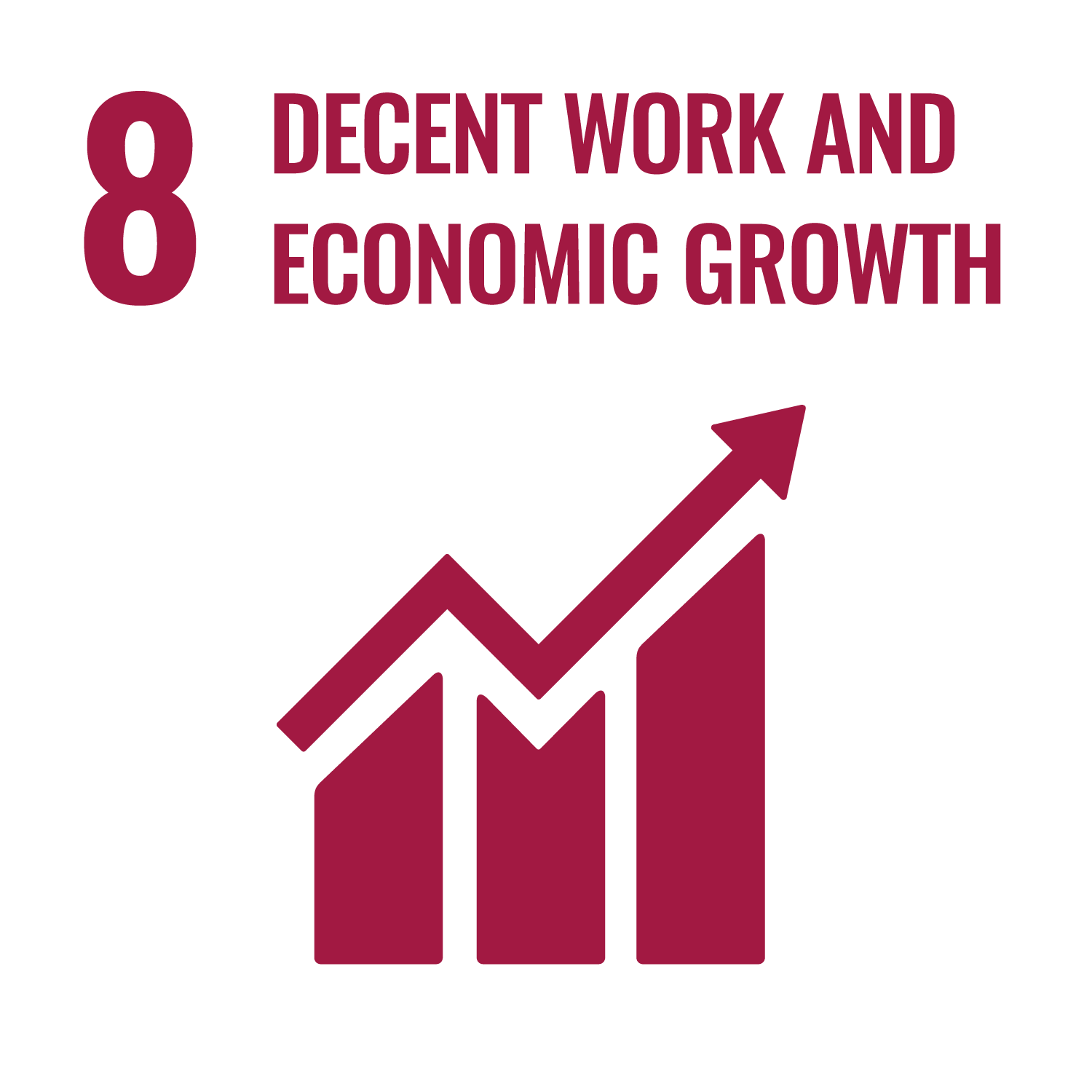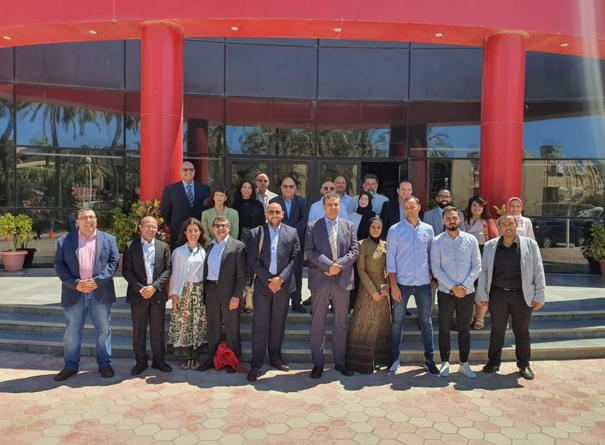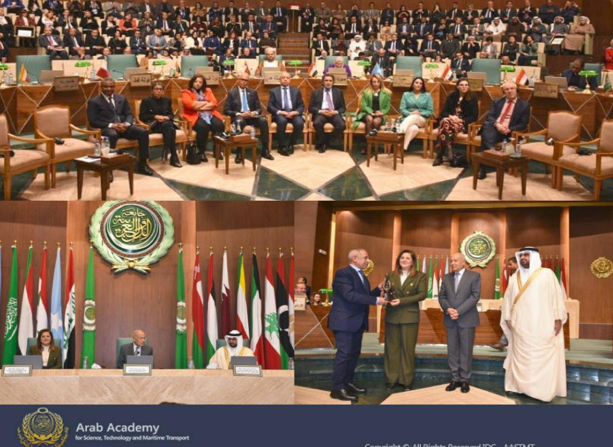 Goal 8. Decent Work and Economic Growth
Goal 8. Decent Work and Economic Growth
8.2.4 Employment policy modern slavery
↵
2023-2024
AASTMT Reaffirms Commitment to Ethical Employment Practices and the Elimination of Forced and Child Labor in Alignment with SDG 8
The Arab Academy for Science, Technology and Maritime Transport (AASTMT) reiterates its unwavering commitment to promoting decent work, fair treatment, and ethical employment practices in accordance with the United Nations Sustainable Development Goal 8 (Decent Work and Economic Growth).
AASTMT upholds a comprehensive Policy Against Forced Labor, Modern Slavery, Human Trafficking, and Child Labor, which ensures that all individuals employed by or associated with the Academy are treated with dignity, equality, and respect. The Academy strictly prohibits any form of coercive, exploitative, or discriminatory labor practices within its operations or through its external partnerships.
This policy reflects AASTMT’s belief that decent work and human rights are inseparable foundations of sustainable economic growth. By implementing clear ethical standards, transparent recruitment processes, and fair contractual terms, AASTMT safeguards the rights and freedoms of all employees, while fostering a workplace environment based on respect, safety, and inclusivity.
Through this institutional commitment, AASTMT contributes to the global efforts aimed at eradicating forced and child labor and ensures that all employment opportunities—whether academic, administrative, or technical—adhere to the highest standards of fairness and legality.
“Our human resources represent the cornerstone of AASTMT’s success. Protecting their rights and ensuring fair, safe, and inclusive working conditions are central to our mission,” said an AASTMT spokesperson.
By upholding these principles, AASTMT actively supports SDG 8, promoting decent work for all, ethical labor governance, and sustainable economic development across the education and maritime sectors., please read AASTMT Policy against Forced labor, modern slavery, human trafficking, and child labor at the following link:
AASTMT Reaffirms Commitment to Ethical Employment Practices and the Elimination of Forced and Child Labor in Alignment with SDG 8 on AASTMT webpage
The AASTMT also organized events to spread awareness about the risks of Forced labor, modern slavery, human trafficking, and child labor, the following are some of them:
AASTMT Champions Inclusive Work and Ethical Employment Practices at “Differently-Abled” Celebration
Cairo, Egypt — The Arab Academy for Science, Technology and Maritime Transport (AASTMT) reaffirmed its commitment to inclusive employment, ethical labour standards and decent work opportunities by participating in the fifth edition of the “Celebration for People of Determination and Persons with Special Abilities” held on 28 February 2024 at Al Manara International Conference Center, New Cairo.
This event aligns deeply with SDG 8: Decent Work and Economic Growth, which emphasises sustained, inclusive and sustainable economic growth, full and productive employment and decent work for all. By actively engaging in this platform, AASTMT underscores that decent work must be accessible to every member of its community, including persons with special abilities.
Moreover, AASTMT’s participation highlights the institution’s broader policy framework against forced labour, modern slavery, human trafficking and child labour — a zero-tolerance approach that forms a key pillar of the Academy’s employment policies.
Key highlights:
- AASTMT reinforces non-discrimination and inclusive employment, ensuring that persons of determination are integrated and valued within the workforce.
- Through its policy against modern slavery, the Academy affirms that no form of exploitation or forced labour will be tolerated in its operations or supply chains.
- The event demonstrates that AASTMT views diversity and equal opportunity not only as social responsibilities, but as essential to the creation of decent work, innovation and sustainable growth.
- By aligning its institutional practices with SDG 8, the Academy supports the creation of secure employment, fair treatment, and ethical employment systems for all its staff, students and stakeholders.
Please visit the AASTMT website for more information about the event:
AASTMT Champions Inclusive Work and Ethical Employment Practices at “Differently-Abled” Celebration
AASTMT Reinforces Student Engagement, Inclusive Opportunity & Ethical Frameworks in Meeting with Student Union
Cairo, Egypt – March 13, 2024 – The Arab Academy for Science, Technology and Maritime Transport (AASTMT) today reaffirmed its commitment to inclusive institutional culture, student empowerment and ethical employment frameworks during a formal meeting between President Prof. Dr. Ismail Abdel Ghaffar Ismail Farag and the Student Union at the Sheraton Campus. This event underscores the Academy’s dedication to the principles of SDG 8 – promoting sustained, inclusive and productive economic growth, full and productive employment, and decent work for all.
In his remarks, the President congratulated students on the upcoming month of Ramadan, commended their role as ambassadors of their peers, and emphasized the Academy’s ongoing support for student representation, campus activities, and inclusive participation in decision-making.
Promoting Inclusive Opportunity & Ethical Practices
This meeting reflects AASTMT’s broader institutional commitment to creating an environment where students, faculty and staff are given equal opportunity, voice and representation—essential elements of decent work and inclusive growth as outlined in SDG 8.
- By fostering active student involvement in governance, the Academy supports skills development, leadership, and participatory engagement—key components of productive employment and capability building.
- The inclusive nature of the engagement also aligns with anti-discrimination and non-exploitation tenets, ensuring that no individual is excluded or marginalized.
- By promoting transparent and fair institutional processes, AASTMT reinforces its stand against modern slavery, forced labour or otherwise unethical employment practices – affirming a zero-tolerance policy across its operations and supply chains.
Looking Ahead
AASTMT will continue to strengthen its frameworks for inclusive governance, student and staff engagement, ethical employment and training opportunities that align with SDG 8. The Student Union will remain a key partner in advocating for student welfare, participation and professional growth as the Academy advances its strategic plan for 2021-2026.
For more information about the event, please visit the following link on the AASMT website:
AASTMT Reinforces Student Engagement, Inclusive Opportunity & Ethical Frameworks in Meeting with Student Union
AASTMT Celebrates World Creativity and Innovation Day, Reinforcing Ethical Employment & Inclusive Growth
Cairo, Egypt – [April 22, 2024] – The Arab Academy for Science, Technology and Maritime Transport (AASTMT) organised a vibrant celebration of World Creativity and Innovation Day, reaffirming its commitment to fostering innovation, inclusive opportunity, and ethical employment practices across its academic community.
Held under the theme of creativity and sustainable development, the event underscores AASTMT’s alignment with SDG 8 — promoting sustained, inclusive and sustainable economic growth, full and productive employment, and decent work for all. By embracing creative thinking, entrepreneurship and inclusive participation, the Academy strengthens its role in developing future-ready graduates and staff who contribute meaningfully to a just and dynamic economy.
Commitment to Ethical Employment & Anti-Modern Slavery Principles
In parallel with the celebration, AASTMT reaffirmed its zero-tolerance policy against forced labour, human trafficking and any form of modern slavery. The Academy emphasises that creativity, innovation and opportunity must always be built on foundations of fair employment, dignity, and respect for all individuals.
By promoting creative engagement for students, faculty and staff — regardless of gender, nationality, ability or background — the event reinforces inclusive work practices and non-discriminatory labour policies. This approach ensures that all members of the AASTMT community have equitable access to development, leadership roles and meaningful work — key components of SDG 8’s vision.
Key Highlights
- AASTMT brought together students, faculty, and staff in interactive workshops and innovation-focused activities that encourage problem-solving, collaboration and inclusive participation.
- The Academy communicated its employment standards that align with international best practices, ensuring that all employees and partners are treated fairly, respectfully and without exploitation.
- By fostering creativity among a diverse community, AASTMT supports the cultivation of a workforce equipped for sustainable economic growth, while safeguarding against discriminatory or exploitative employment conditions.
Quote:
“At AASTMT we believe that real innovation thrives only when every individual is valued, given the opportunity to grow and protected from injustice,” said Prof. Dr. Ismail Abdel Ghaffar Ismail Farag, President of AASTMT. “Our observance of World Creativity and Innovation Day is more than a celebration — it is a reaffirmation of our commitment to decent work, inclusive growth and ethical employment practices in line with SDG 8.”
For more information about the event, please visit the following link on the AASMT website:
AASTMT Celebrates World Creativity and Innovation Day, Reinforcing Ethical Employment & Inclusive Growth
AASTMT Celebrates Labour Day with Commitment to Inclusive, Fair Work for All
Cairo, Egypt — May 1, 2024-On the occasion of International Labour Day, the Arab Academy for Science, Technology and Maritime Transport (AASTMT) extends warm greetings to all members of its community — academic staff, administrative staff, employees, and students.
This year’s celebration takes on added significance as AASTMT reaffirms its institutional dedication to the principles of Sustainable Development Goal 8 (SDG 8): Decent Work and Economic Growth — particularly its emphasis on inclusive, equitable employment and non-discriminatory decent work for all.
Commitment to non-discrimination and inclusive employment
AASTMT acknowledges that only by eliminating all forms of discrimination — whether based on race, gender, religion, nationality, disability, or any other status — can the goal of “decent work for all” be achieved. The Academy affirms that every member of its workforce and student body has the right to a respectful, fair and inclusive environment.
Fair and sustainable work practices
At AASTMT, this labour-day acknowledgement is not merely symbolic: it reinforces the Academy’s policies and practices that support full and productive employment, transparency in workplace relations, equitable career progression, and safe working conditions. By aligning with SDG 8, AASTMT emphasizes that growth must be sustainable, inclusive, and rooted in respect for human dignity.
A unified community advancing decent work
The President of AASTMT, Prof. Dr. Ismail Abdel Ghafar Ismail Farag, celebrated the entire AASTMT “family” and reiterated the institution’s focus on building a culture where all members — employees, faculty and students — are empowered, heard, and given fair opportunity. He underlined that Labour Day provides a moment to reflect on the ongoing journey towards inclusive employment and equitable organisational development.
Quote:
“Today we honour the commitment of every member of our community,” said Prof. Farag. “Our goal is to ensure that each person at AASTMT can work, study and grow in an environment free from bias, discrimination and exploitation — because decent work is a universal right and a foundation for sustainable growth.”
For more information about the event, please visit the following link on the AASMT website:
AASTMT Celebrates Labour Day with Commitment to Inclusive, Fair Work for All
2022-2023
The Arab Academy for Science, Technology, and Maritime Transport (AASTMT) is committed to upholding a strong policy against forced labor, modern slavery, human trafficking, and child labor. AASTMT recognizes the importance of promoting ethical and responsible employment practices within its institution and among its stakeholders. This commitment extends to ensuring that all employees and individuals associated with AASTMT are treated with dignity and respect and that their rights and freedoms are protected. By adhering to this policy, AASTMT actively contributes to the prevention of modern slavery and human trafficking while supporting a fair and just employment environment, both internally and in its engagement with the broader community.
Policy against Forced labor, modern slavery, human trafficking, and child labor
Description
The Arab Academy for Science, Technology, and Maritime Transport is a higher education institution with the mission of "advancing education and knowledge through teaching and research, as well as the application of knowledge to societal welfare, particularly through teaching and research in technological, scientific, social, and professional disciplines. Along with its national and international responsibilities, it will have a special commitment to the Arab Region’s economic and educational well-being.
Our mission is to advance social and economic development sustainably via exceptional teaching, research, and innovation. In carrying out this objective, the University is committed to becoming a values-driven organization, with trust as the cornerstone of our relationships and integrity at the heart of everything we do. As such, the University is entirely dedicated to hiring personnel, engaging with, and supporting students, procuring goods, services, and works, and otherwise conducting business in an ethical and non-harmful manner.
By depriving individuals of their liberty or exploiting them for personal or commercial gain, forced labor, modern slavery, human trafficking, and child labor are considered national and international crimes and violations of fundamental human rights. The University is dedicated to preventing any violations of human rights and will take appropriate action if this policy is breached.
Scope
This policy applies to all University staff at all levels, adjunct staff, interns, volunteers, outsourced staff, and workers. This policy applies to all University activities and processes that might have potential risks including but not limited to Recruitment and Procurement processes.
Aim
This statement demonstrates the University’s compliance with the Modern Slavery Acts by informing all members of the University community and other stakeholders about the University’s policies and practices regarding the risk of modern slavery, human trafficking, forced and bonded labor, and labor rights violations in its supply chains.
Policy Statement
The University maintains a zero-tolerance policy for modern slavery and human trafficking, as well as for violations of human rights. We are dedicated to operating ethically and with integrity in all of our commercial dealings and interactions, as well as to adopting and enforcing effective systems and procedures to guarantee that the University does not contribute in any manner to modern slavery. Along with this statement, we have a variety of policy statements that substantiate our commitment.
Procedures
The Labor Policy reaffirms the commitment of the Arab Academy for Science, Technology and Maritime Transport to basic human rights as a foundational component of how the University conducts business and collaborates with its employees, as well as its commitment to establishing a work environment that respects everyone’s dignity and worth. Modern slavery and human trafficking are not tolerated at the University.
The University is committed to adhering to the following standards:
- The University will adopt sound collective bargaining methods to ensure that both the University and its employees have an equal voice during discussions and that the outcome is fair and equitable.
- The University’s administration shall refrain from imposing punitive measures — such as threatening, fining, suspending, or terminating — against employees who exercise their rights.
- The University’s administration shall refrain from using intimidation, arbitrary searches, or police or military action to restrict workers’ rights to associate freely.
- The University’s administration should not impose any restrictions on employees who choose to freely terminate their employment, such as excessive notice periods or hefty fines for contract termination. Contracts of employment must also adhere to legal standards.
- While the Arab Academy for Science, Technology, and Maritime Transport does not employ children as part of its corporate social responsibility, the university complies fully with Egyptian labor regulations governing child labor.
- No child labor shall be employed. Processing workers must be at least 18 years old (or the legal minimum age, if applicable) and, where applicable, not younger than the compulsory school age. Discrimination-free living is a fundamental human right. Workers should not be discriminated against based on their gender, age, ethnicity, religion, or any other factor unrelated to their job performance. Hiring, salary, promotion, termination, and retirement policies, as well as access to training, should be based on an individual’s capacity to execute the job effectively, not on his or her traits.
- Any staff member who violates the above values is subject to disciplinary action, which may result in dismissal.
- Any supplier who violates our values or the outlined policy is immediately suspended from the University’s list and will not be considered for future collaboration unless they can demonstrate complete compliance with the Modern Slavery Act and the University’s policies and procedures.
Review program
Policy title | Policy against Forced labor, modern slavery, human trafficking and child labor |
Date created | October 2020 |
Dates reviewed | October 2022 and October 2023 |
Approving body | Human Resources Affairs Department |
Version | 2 |
Next review date | November 2025 |
Policy owner | Human Resources Affairs Department |
Lead contact | Head of Human Resources Affairs Department |
Approval Signature | Dr. Yasser Gaber Dean of Scientific Research and Innovation |
AASTMT Policy against Forced labor, modern slavery, human trafficking, and child labor
The AASTMT also organized events to spread awareness about the risks of Forced labor, modern slavery, human trafficking, and child labor, the following are some of them:
AASTMT participates in the activities of the GREENLAND project
The Arab Academy for Science, Technology, and Maritime Transport (AASTMT) has been an active participant in the Greenland project, a vital initiative dedicated to promoting sustainable development and economic growth across the Mediterranean region. This project closely aligns with Sustainable Development Goal 8 (SDG 8), which emphasizes sustained, inclusive, and sustainable economic growth, as well as full and productive employment and decent work for everyone. AASTMT's role in the Greenland project underscores its dedication to advancing this goal by contributing to job creation that upholds fair labor practices and ethical employment standards.
AASTMT’s involvement in the Greenland project also includes reinforcing its strong stance against forced labor, modern slavery, human trafficking, and child labor. Recognizing its responsibility to prevent exploitative labor practices in its development efforts, AASTMT actively pursues these objectives in collaboration with other project partners. By promoting the principles of decent work and social justice as outlined in SDG 8, AASTMT contributes to the larger goal of eradicating forced labor, modern slavery, human trafficking, and child labor in the Mediterranean region. This commitment reflects AASTMT’s dedication to building a more equitable and sustainable future for all.

Read more about the project
GREEN-skiLls for a sustAiNable Development
The AASTMT and the Arab League celebrate the Arab Sustainability day
On March 15, 2023, the Arab Academy for Science, Technology, and Maritime Transport (AASTMT) celebrated Arab Sustainability Day in collaboration with the Arab League, highlighting a regional commitment to sustainable development and fair employment practices. This celebration underscored the values central to Sustainable Development Goal 8 (SDG 8), which promotes sustainable economic growth, decent work, and ethical labor standards. Through discussions, workshops, and panels, the event brought attention to pressing issues like fair wages, safe working conditions, and inclusive employment policies. By fostering a platform for knowledge-sharing and awareness, AASTMT and the Arab League aimed to inspire both public and private sector organizations to prioritize these values in their employment policies, contributing to a more equitable and sustainable economy across the Arab world.
A core focus of the celebration was on eradicating modern slavery and forced labor, key components of SDG 8’s call for decent work and economic inclusion. Through this event, AASTMT and the Arab League emphasized the importance of robust employment policies that prevent exploitative practices, such as modern slavery and human trafficking, while promoting social justice and respect for workers' rights. By aligning regional efforts with SDG 8, the celebration not only reinforced the importance of ethical employment standards but also encouraged a commitment to eradicating forced labor in all forms. This joint initiative demonstrated a proactive approach to protecting vulnerable workers and advancing a sustainable future that upholds dignity and fairness for all.

2021 - 2022
The Arab Academy for Science, Technology, and Maritime Transport (AASTMT) is committed to upholding a strong policy against forced labor, modern slavery, human trafficking, and child labor. AASTMT recognizes the importance of promoting ethical and responsible employment practices within its institution and among its stakeholders. This commitment extends to ensuring that all employees and individuals associated with AASTMT are treated with dignity and respect and that their rights and freedoms are protected. By adhering to this policy, AASTMT actively contributes to the prevention of modern slavery and human trafficking while supporting a fair and just employment environment, both internally and in its engagement with the broader community. For more information about AASTMT’s Policy against Forced labor, modern slavery, human trafficking, and child labor, please read AASTMT Policy against Forced labor, modern slavery, human trafficking, and child labor
The AASTMT also organized events to spread awareness about the risks of Forced labor, modern slavery, human trafficking, and child labor
AASTMT Participates in The Activities of The GREENLAND Project
The Arab Academy for Science, Technology, and Maritime Transport (AASTMT) has actively participated in the Greenland project, a significant initiative aimed at fostering sustainable development and economic growth in the Mediterranean region. This project aligns closely with Sustainable Development Goal 8 (SDG 8), which focuses on promoting sustained, inclusive, and sustainable economic growth, full and productive employment, and decent work for all. AASTMT's involvement in the Greenland project underscores its commitment to advancing this SDG by contributing to the creation of employment opportunities that are characterized by fair labor practices and ethical employment standards.
Part of AASTMT's role in the Greenland project involves reinforcing its policy commitment against forced labor, modern slavery, human trafficking, and child labor. AASTMT recognizes the crucial role it plays in ensuring that the development activities it engages in do not inadvertently perpetuate exploitative labor practices. By actively working towards these goals in collaboration with other project partners, AASTMT helps promote the principles of decent work and social justice, as outlined in SDG 8, thereby contributing to the broader mission of eradicating forced labor, modern slavery, human trafficking, and child labor within the Mediterranean region. Through this commitment, AASTMT demonstrates its dedication to creating a more equitable and sustainable future for all.
Learn more about the project on AASTMT research project:
Project: Green land Green skills for a Sustainable Development
Learn about the project on ENI EU weblink:
GREEN-skiLls for a sustAiNable Development
Gender Equity and Anti-modern slavery workshop [4]
In the past, AASTMT demonstrated a strong commitment to both promoting gender equity in the MENA region and combating child labor, forced labor, modern slavery, and human trafficking. Through its initiative titled "Gender Equity in the MENA Region," AASTMT took a leading role in addressing these pressing issues while aligning with the principles of Sustainable Development Goal 8 (SDG 8). AASTMT recognized that safeguarding the rights and safety of women in the urban workforce required not only gender-friendly cities but also a comprehensive commitment to eradicate exploitative labor practices.
Under the banner of "Gender Equity in the MENA Region," the initiative's authors not only advocated for gender equity but also actively worked towards eradicating child labor, forced labor, and human trafficking. Their discussions went beyond the parameters of the United Nations' Gender Inequality Index (GII) to encompass diverse subjects and domains related to women's rights and labor practices. They explored essential questions such as whether women's rights were upheld in the design of new cities, whether women were protected from exploitation in the labor market, and whether measures were in place to combat child labor and human trafficking. This comprehensive approach, involving stakeholders from various backgrounds, made a significant contribution to advancing inclusive urban development and fulfilling AASTMT's commitment to ethical labor practices and SDG 8 objectives.
Learn about Gender Equity In Cities Of The Mena Region event on AASTMT research weblink



